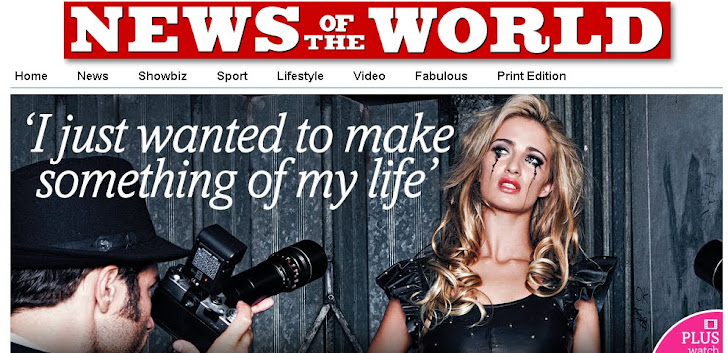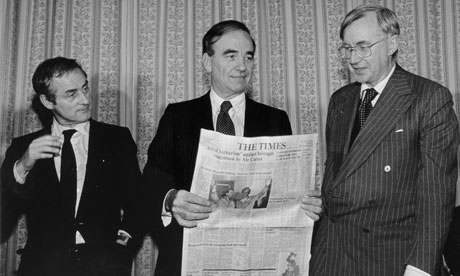In a new preface to his book, Good Times, Bad Times, the former Sunday Times editor connects the phone-hacking crisis to earlier events at News International
Rupert Murdoch, the new owner of Times Newspapers in 1981, flanked by Harold Evans and William Rees Mogg. Photograph: Popperfoto/Getty
There is a clear connecting thread between the events I describe in Good Times, Bad Times and the dramas that led so many years later to Rupert Murdoch's "most humble day of my life". I was seated within a few feet of him in London on 19 July 2011, during his testimony to a select committee of MPs with his son James at his side. Not many more than a score of observers were allowed into the small room at parliament's Portcullis House, across the road from the House of Commons and Big Ben. A portcullis is a defensive latticed iron grating hung over the entrance to a fortified castle, the perfect metaphor for News International, which perpetually sees itself as beset by enemies.
It persisted with the unravelling story almost alone in the face of repeated denials, defamation and threats and the sloppy exonerations of News International by Scotland Yard and the Press Complaints Commission. Among those waiting patiently – one might say humbly – for admission to the Portcullis House committee room was Nick Davies, the backpacking Guardian reporter, who led the paper's investigation courageously sustained by his editor Alan Rusbridger. It was cheering to think of the impetus for good contained in Davies's little notebook as he assiduously scribbled away during the hearing.
Murdoch had begun badly on jetting into London, all smiles in a jaunty panama hat and embracing his ex-editor and CEO Rebekah Brooks whom he called his "first priority"; she was arrested days later. He made his first humbling visit, this one to apologise to the family of Milly Dowler, a missing schoolgirl. They were given brief hope she might be alive when messages on her cell phone were erased. Alas, the erasures were not by Milly, who had been murdered, but by an obscene hacker employed by Murdoch's News of the World to make room for more messages the paper could milk for despicable "exclusives". Murdoch hoped to expunge the memory of that obscenity by expunging the News of the World itself. In 1969 it had been his first acquisition in Britain but the immediate end of 168 years of publication was left to his son James, its chairman....read more
http://www.guardian.co.uk/media/2011/sep/18/harold-evans-rupert-murdoch-leadership?CMP=twt_fd

